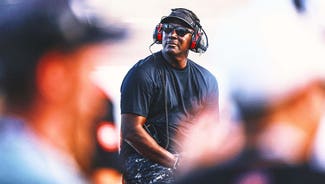
NASCAR panel reduces JGR penalties
A NASCAR appeals panel sided with Joe Gibbs Racing on Wednesday and eased some of the penalties imposed for having an illegal part in Matt Kenseth's race-winning engine at Kansas last month.
NASCAR punished JGR after discovering during a post-race inspection that one of eight connecting rods in the engine at the April 21 race did not meet the minimum weight requirement. The part was too light by 3 grams, less than the weight of an envelope.
JGR did not dispute the part was illegal, but argued the penalties were too severe because it leases its engines from Toyota Racing Development and is not permitted to touch anything inside of them. Toyota accepted responsibility and insisted one light rod did not give Kenseth a performance advantage.
The three-member National Stock Car Racing Appeals Panel agreed and dramatically reduced almost every penalty.
The points deducted from Kenseth were reduced from 50 to 12, which moves him from 11th in the standings to fourth. The panel also reinstated the three bonus points he earned for the victory for seeding in the Chase for the Sprint Cup championship.
The panel also reduced crew chief Jason Ratcliff's suspension from six races to one race, and eliminated the six-race suspension for owner Joe Gibbs. It let stand Ratcliff's $200,000 fine. The only action the panel took was increasing Toyota's penalty from a five-point fine to seven points.
''Glad to have today behind us so we can get our focus back on racing. I respect NASCAR and the appeals process, I feel like they got it right,'' Kenseth posted on Twitter.
Gibbs said he was done with the process and would not appeal anything further.
''Right now, we just want to get back to racing,'' the team owner said.
NASCAR is not eligible to appeal anything further to chief appellate officer John Middlebrook. Spokesman Kerry Tharp said the sanctioning body was disappointed in the decision.
''Our sport has a due process system in place that has served this sport very well for more than 65 years, and that due process resulted in this decision here today,'' Tharp said. ''While we are disappointed by today's outcome, we stand firmly behind our inspection process. The inspection of engines, and engine parts and pieces has always been regarded as the holy grail throughout the industry - that along with fuel and tires. In violations such as these, we have no other reinforcement process than to penalize the team owner and team members. That's how our system works.''
The appeal was heard by Mark Arute, general manager of Stafford Motor Speedway in Connecticut, Denis McGlynn, CEO of Dover International Speedway and Jack Housby, who fielded cars in the 1970s and `80s.
Of the 151 appeals heard since NASCAR began keeping records in 1999, penalties were upheld 106 times. The panel reduced penalties 32 times, eliminated penalties 11 times and increased them twice.
A week ago, the panel unanimously upheld all penalties levied against Penske Racing for using parts confiscated by inspectors before the April 13 race at Texas. But the six-race suspensions for seven key Penske employees were reduced Tuesday to two points races and the All-Star race by Middlebrook, which team owner Roger Penske celebrated as a small victory.
Gibbs seemed far more subdued by what could only be considered a major victory.
''This has been a tough, tough week for everyone,'' he said. ''Certainly no one wanted this to happen, and we're committed to making sure it never happens in the future. I want to emphasize that after going through this process we have great for our sport, and in particular, NASCAR. All of us at Joe Gibbs Racing are committed to being good partners and we want to race with NASCAR forever. We're going to work extremely hard with TRD to make sure this never happens again and right now we just want to get back to racing.''
In the days after the penalty, Gibbs was concerned with his reputation and that NASCAR had completely overlooked intent in levying punishment.
TRD officials immediately accepted responsibility for the bad part, claiming it came from the manufacturer underweight with accompanying paperwork that clearly stated its weight. It was missed in the TRD chain of command and installed in an engine that was shipped from California to JGR's shop in North Carolina, where it was installed in the car Kenseth raced at Kansas.
After NASCAR discovered it during a thorough inspection following the win at its Research & Development Center in Concord, Toyota went through all of its vendor paperwork and pulled three of Clint Bowyer's engines because three connecting rods were too close for comfort.
Toyota Racing Development vice president David Wilson was present Wednesday for JGR's appeal, and Gibbs said he did not expect TRD to make the same mistake again.
''We have really addressed that. Heavily,'' Gibbs said. ''I think this is probably going to change several things the way Toyota was doing them. I think this was good for them for the future. It was a heavy emphasis for them. They accepted this as being something that failed in the system and they are committed to fixing the system. You can't have this.''

